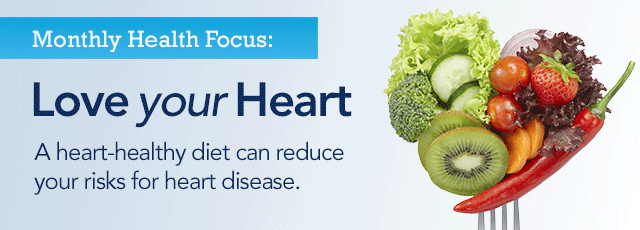Health Focus: Heart Health Content (Feb '15)


Food for the Heart
The American Heart Association (AHA) promotes a diet that can help reduce the major risk factors for heart disease, high blood cholesterol, high blood pressure and excess body weight. Following these guidelines can help you achieve a healthier diet – and a healthier you!
- Get the right fats and oils. Monounsaturated fats such as olive oil, canola oil and peanut oil as well as olives, nuts and avocados may help lower blood cholesterol levels. Just remember, even healthy fats should be eaten sparingly.
- Fish is a lifesaver. Two 3.5-ounce servings of fish per week are recommended. Fresh or canned tuna, salmon and mackerel have high levels of desirable omega-3 fatty acids.
- Limit fast foods and processed meat. They are usually high in saturated fats, which can increase blood cholesterol and increase risk for heart disease. The AHA recommends eating no more than two servings of processed meat per week.
- Avoid trans-fatty acids found in partially hydrogenated vegetable oil. Trans fats act like saturated fats and can raise blood cholesterol levels. Check labels for trans fats, which are often found in processed foods, baked goods, fast foods and some margarine.
- Eat a variety of colorful fruits and vegetables each day. Aim for at least 4 1/2 cups.
- Go for whole grains. Three 1-ounce servings a day is recommended. Whole grains contain more fiber and nutrients than refined grains. Look for the word "whole" in the ingredient list to verify the product is truly a whole grain.
- Choose lean proteins such as beans, fish, skinless poultry, and lean beef or pork. Five to six ounces a day is recommended for most healthy adults.
- Get dairy daily. Dairy choices should be low-fat or fat-free. Calcium-fortified soy milk is also part of the dairy group. Healthy adults should aim for 3 cups of dairy each day.
To stay healthy, the AHA also recommends the following:
- Limit sodium to 1,500 mg or less per day.
- Keep sugar-sweetened beverages to 450 calories or 36 ounces a week.
Make healthy food choices everyday. Your heart will thank you for it.
Additional resources:
This information is provided for general informational purposes. Information contained in this communication is not intended to replace professional medical advice, diagnosis or treatment. Always seek the advice of your physician or other qualified healthcare provider regarding your healthcare needs. Never disregard professional medical advice or delay seeking medical advice because of something you have read in this informational piece. Always check your benefits for coverage information and limitations.
